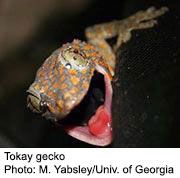- 7 Best Breads for Maintaining Stable Blood Sugar
- Gelatin vs. Collagen: Which is Best for Skin, Nails, and Joints?
- The Long-Term Effects of Daily Turmeric Supplements on Liver Health
- Could Your Grocery Store Meat Be Causing Recurring UTIs?
- Are You Making This Expensive Thermostat Error This Winter?
- Recognizing the Signs of Hypothyroidism
- 10 Strategies to Overcome Insomnia
- Could Artificial Sweeteners Be Aging the Brain Faster?
- Techniques for Soothing Your Nervous System
- Does the Water in Your House Smell Funny? Here’s Why
Pet Geckos May Pose Health Risk


Your pet gecko might make you sick, a new study suggests.
Researchers analyzed fecal samples from Indonesian tokay geckos — an imported species popular as pets in the United States. They found antibiotic-resistant bacteria in the intestines that may pose a health threat to owners.
“The study shows how importing animals can introduce bacteria into households,” study co-author Sonia Hernandez, an associate professor of wildlife diseases at the University of Georgia, said in a university news release.
“In general, it’s a good idea to know what bacteria an animal is bringing in. Any new animal, especially one imported from another country, could introduce new bacteria into a pet owner’s household,” she added.
The geckos had high rates of resistance to antibiotics commonly used in the United States, such as cephalosporins and penicillins, the investigators found. The lizards also were resistant to antibiotics commonly used in Southeast Asia, such as chloramphenicol, aminopenicillins and tetracyclines.
The findings were published recently in the journal Science of the Total Environment.
If owners don’t handle the geckos properly, they could become ill, warned study co-author Christine Casey, a graduate student in the university’s College of Veterinary Medicine in Athens, Ga.
“Owners, especially children, should always wash their hands after being in direct or indirect contact with geckos,” Casey said in the news release. “If pet owners were to get an infection, then doctors may be unable to treat it with certain antibiotics.”
The geckos also pose an environmental risk if they are set free, she cautioned.
“Tokay geckos are naturally aggressive and that sometimes leads to their release in the wild by owners who were not aware of their behavior. That ends up being a bigger problem when the geckos can transfer their bacteria to other wildlife,” Casey said.
More information
The U.S. Centers for Disease Control and Prevention offers advice about healthy people and pets.
Source: HealthDay
Copyright © 2026 HealthDay. All rights reserved.










